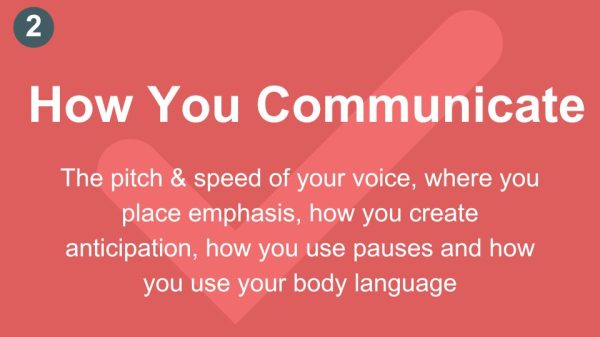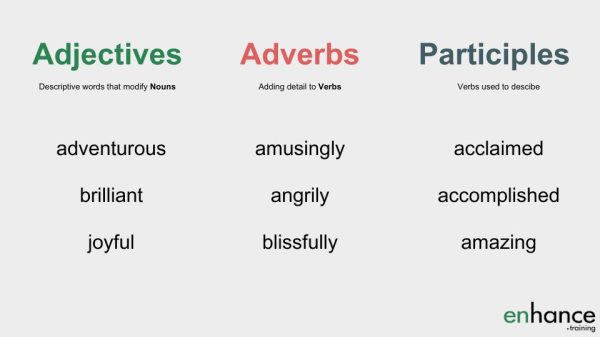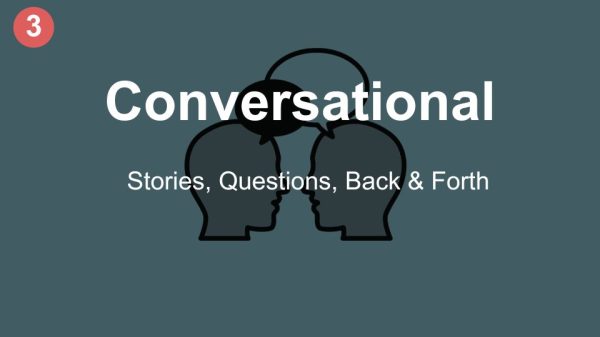Articulate Yourself Better – 8 powerful ways to be more articulate

Want to articulate yourself better? Communicating well with others is probably the most valuable skills to develop at work no matter what your job. When you articulate yourself well people are interested, they understand quickly what you are communicating, what you want, and how they can help.
When you are not confident in speaking clearly, concisely and with structure, eyes glaze over, you get confused looks, you struggle more when working with others, and you are not viewed as valuable as others in the team.
Learn 8 powerful ways to be more articulate.
Articulate Yourself Better – 8 powerful ways to be more articulate
What does it mean to be more articulate
6 benefits of being more articulate
- 8 powerful ways to be more articulate
Watch on YouTube
Listen on Podcast
what does it mean to be more articulate
Being articulate is being better at
- what you say – the words, sentences, stories and the structure used to get your ideas, feelings, thoughts and viewpoints across to other people whether on a one-on-one basis or to large groups
- how you communicate what you say – using the pitch and speed of your voice, where you place emphasis, how you create anticipation, how you use silence and pauses, and how you use your body language with what you say.
When you are articulate you find it easier to keep the other persons attention and make it easier for the other person to understand and follow what you are saying. Articulate yourself better and you will feel more confident and more valued.

6 Benefits of being more articulate
1 – Being more articulate saves you and others a lot of time.
Being able to articulate your thoughts clearly results in quicker understanding in others, a lot less confusion in team members and colleagues and a lot less misunderstandings. Articulate yourself better and you only say things once rather than repeating them 3 or 4 times. You save a lot of time.
2 – Being more articulate builds your confidence in communicating
Whether speaking one-on-one to colleagues or presenting to a group, having people clearly maintaining eye contact, showing attentive body language and asking relevant questions to learn more all help to reinforce and build your confidence in how you are communicating.
3 – Articulate yourself better and enjoy Increased professional success
Be more articulate and communicate better and you improve teamwork and your influence and impact at work which leads to more professional success.

4 – You Build Stronger relationships
Articulate yourself well and be confident communicating your ideas, your feelings and your thoughts and you show more of yourself to others. By being more authentic, you increase others trust in you. Higher trust levels mean building stronger relationships.
5 – Being more articulate leads to bigger professional networks
As you progress your career, your network within a company and external to your company becomes more and more important – for personal support and for your career advancement. The bigger and better your network, the better you do.
6- Improved Public speaking skills
Being articulate and confident when speaking to groups is seen as an important pre-requisite for promotion into leadership and management positions.

How to Become more articulate
I am share 8 powerful ways to be more articulate. Knowing what to do – will not on its own make you more articulate. You need to practice each of these techniques to get the benefits. Being articulate is a skill and I share tips on how to practice each of these 8 ways to be more articulate.
1 – Avoid using filler words
Filler words are the “ummm”, “eeerrr”, “yeahh” and other noises people use to bridge the period when they are thinking about what to say next. Swap these filler words for silence. Whenever you are speaking to others, pay attention to what you say.
Every time you are about to use “uuumm” try to swap it for a pause without any sound being made. It won’t be long before you don’t use filler words at all when articulating your thoughts and feelings. Lots of filler words are distracting.
2 – To be more articulate increase your vocabulary
Learning vocabulary is not about using bigger more complex words. There is a lot of benefit in using simpler words, as more people understand them. Focus instead on learning more descriptive words, so you are able describe your thoughts, ideas and feelings more accurately, with more colour, with more life.
Use a dictionary to find more adjectives, adverbs and participles and incorporate them into your everyday communication. Consciously practice using more descriptive words until you incorporate them naturally into what you say every day.

3 – To be more articulate pronounce your words clearly
This is obvious yet of all the people you know, how would you rank yourself in terms of how clearly you speak? Are you top of your list?
For many people, speaking more slowly, and consciously focusing on finishing each word spoken, makes what they say a lot clearer. Avoid running one word into the next or missing endings to words.
For those that speak slowly, work on speeding up the words you say. Use the body language feedback from others to judge how effective using different speaking speeds are for you and how well you are pronouncing your words.
4 – For how to be more articulate – improve the structure of what you say
Rambling, introducing different ideas or too many ideas, not providing context and not being clear on the points are you are making lead to the other person getting bored, losing the thread of what you are saying or being confused.
A key way to better articulate your thoughts is to communicate the context, present your key arguments or points and then ask for an action, a decision or provide a summary. Creating a structure that logically leads the person from one step to the next will keep their attention and increase their understanding.
A good way to practice structuring your arguments is to write them down and review them. The better you get at structuring your writing, the better you will be at structuring what you say.
Keep what you write short – start with 150-200 words and then maybe expand to 500 words.

5 – Be more articulate by knowing your audience
Are you speaking to analytical professionals, time poor managers or your local builders? What language and speaking styles are they using? Are they serious in their outlook or cracking lots of jokes? Adapt how you articulate your thoughts and feelings and mirror their language and styles. Pay attention to the feedback your audiences provide, via their body language and adapt to articulate yourself better.
For example, change your style from more formal to more relaxed conversational style or vice versa. Change the length of the sentence you use to simpler or more complex. Include more examples and detail or elevate what you articulate to more “bigger picture”. Adapt how you articulate your thoughts and feelings to your audience.
6 – Be more articulate by varying your style and tone
People take in information, thoughts, and ideas in different ways. To articulate yourself well, be mindful of 4 different ways people take in information and adapt how you articulate your thoughts to cover all of them if you can.
The first is those that like the big picture, the high level view so they can understand the context and how everything fits together easily. Create diagrams, speak to the context and ask questions to get them thinking about the big picture.
Second are those that focus on the group, on others and are altruistic. Talk about the wider benefits, the contribution to the group or the local community. Link what you are communicating into how your audience can help benefit others.
Third are those that like stories, are more relaxed and want friendly conversational styles and approaches. Create relevant stories, ask more questions and get more back and forth going in the conversation.
Fourth, are those that love data and are more analytical. So include charts, graphs, facts and figures in how you articulate yourself to cater for people who are analytical.
By trying to balance how your articulate yourself to the different ways people take in information, you will get more attention and understanding from your audience.

7 – Be more articulate by practice speaking in private
As mentioned earlier, communicating is a skill and improving how you articulate yourself requires practice.
Speaking in front of a mirror is a good way to work on your facial expressions and how you use your arms and hand to emphasise points being made. Your tone and body language and the emphasis you put on what you say will change the meaning of the words being said.
When I started creating videos and podcasts, I practiced by filming myself and reviewing how I looked and sounded. Videoing yourself is really easy to do with your mobile. Play around with different approaches, styles, talking speeds and arm gestures. Compare what you remember yourself doing and saying versus how it comes across in the recording. This is good way to build up your self-awareness when speaking.
8 – Be more articulate by practicing with a group
Speaking to a group is about getting comfortable speaking to bigger audiences and managing all your emotions and fears while doing so.
Seek out opportunities to speak to groups at work. Present in your team meeting. Ask to speak in company meetings, project meetings or before bigger groups.
There are lots of ways to get practice speaking to groups outside of work too. Four ideas include:
- Joining Toastmasters or similar speaking groups
- Taking a public speaking course
- Join a standup comedy course or
- Take acting classes
All of these will give you plenty of opportunity to speak in front of different sized groups and give you practice to better articulate your thoughts and feelings.

In summary
Put some effort in and you will articulate yourself better. I have shared 8 powerful ways to be more articulate and now it is up to you to put these techniques into practice.
There is a lot to be gained by being more articulate at work and outside of work and we have been through 6 big benefits. Please put just a bit of work into improving how you articulate yourself and see the difference it makes to your confidence and how you are perceived by others. Then put in more practice and get much more benefits.
If you have any questions on “Articulate Yourself Better – 8 powerful ways to be more articulate”, please email me at support@enhance.training and I will get back to you.
I was shy at school, and I hated speaking in front of small groups. I wasn’t confident in how I spoke, and watching their eyes glaze over and their attention wander reinforced my belief that I wasn’t good at articulating my thoughts and speaking to groups.
My mindset was a big part of the problem. Many years later and with a lot of practice at articulating myself better, I know the benefits of being more articulate are huge and how that helps you at work and as a manager.






